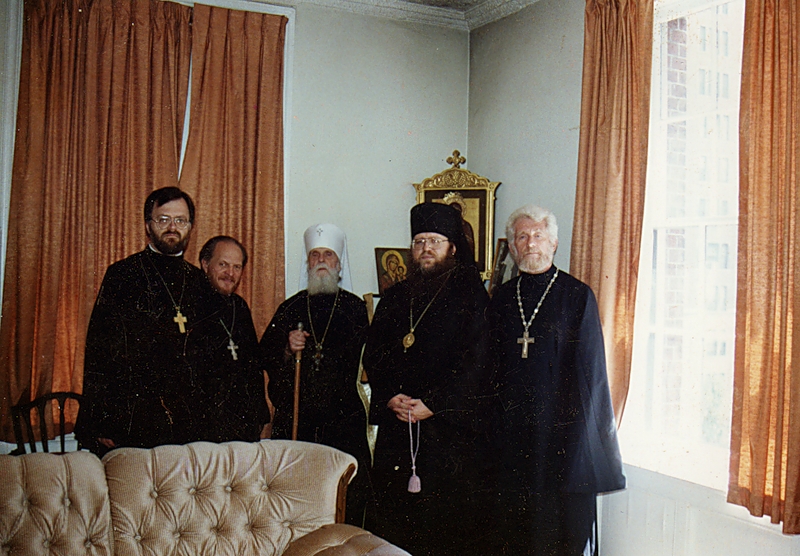From the Editor
From the very dawn of its existence, the Russian Orthodox Church Outside of Russia has acted as a free voice of the persecuted Russian Church, informing the world community about the things happening inside of Russia. Naturally, any and all actions aimed at protecting the dignity of the Orthodox Church in the USSR have been welcomed. In this context, the human rights movement that emerged within the Russian Orthodox Church in the 1960s aroused the sympathy of ROCOR clergy. In their own words, Orthodox dissidents confirmed the lack of religious freedom in the USSR, to which the ROCOR testified in exile. However, their experience of forming an Orthodox worldview under different conditions led to unpleasant disappointments, as can be seen in this letter. It is, therefore, understandable that these “allies” in the struggle against godless power during the Cold War could lose interest in each other after the fall of the Iron Curtain.
Protodeacon Andrei Psarev
October 27, 2024
Beloved in Christ, Father Gleb,
With attention and love, we have read a lot that is written by you and your friends in defense of the Orthodox Church and that makes it out of Russia. We deeply appreciate your dedication and your courage in exposing various negative traits of the church life around you.
You do not need our praise for doing that, because, as you make the feat of confession, exposing yourself to various dangers, God knows the price of your labors and He Himself will reward you according to your merits.
We understand the difficulties of your position and, together with all the children of the persecuted Russian Church, experience that same loneliness in the surrounding world, but we are not surprised of all that, for the Savior Himself foretold us, “In the world you will have tribulation” (Jn 16:33). The same should be expected especially in the current period of apostasy in human history.
For more than half a century, we have been crying out to the surrounding world, trying to draw its attention to the plight of our people and to warn other peoples, so that they do not become victims of the same ills. Rarely do we find a positive response, but we do not lose our heart because of that.
However, we have a duty to tell you something in which we disagree with you.
When a person experiences severe distress, he is often willing to ask for help from anyone around him, without distinguishing whether they are of the same faith as him or not. This is only acceptable in legal or material matters. The history and the tradition of the Orthodox Church do not tell us of any cases where hope was placed not on the intercession of the Theotokos and of the saints of God, but on those who are alien to our church and sometimes are even enemies of Her.
Generally, in our relationship with those who belong to the non-Orthodox confessions, it is necessary to be especially careful that, in our desire to obtain their sympathy and support, we do not not get close to that which separates them from Orthodoxy.
Not so long ago, you stretched out your hands for help and protection to the Protestants, represented by the World Council of Churches during its World Conference in Nairobi. The news about this spread widely, but there was no appropriate response. That did not surprise us at all. We know from experience that the Protestant world is often more inclined to believe the assurances of the Moscow Patriarchate on the complete well-being of religion in the Soviet Union, rather than the most convincing evidence of the terrible persecution of the Faith by the atheists.
Moreover, such conferences, instead of helping the faithful, have recently decided to provide significant financial assistance to the communist guerrillas in Africa, who were brutally killing Christian missionaries, and sometimes entire families with their children.
Should we be turning to such traitors of Christianity for help?
What especially saddened us, however, was your appeal to the Pope.
All that you write there about Metropolitan Nikodim is true. But, because he was betraying his Church to atheists when he fell down dead at the feet of the Pope, he was not asking the Pope for help for Orthodoxy, but was just telling him something important about new steps toward the betrayal of Orthodoxy, something which the Pope hesitated to declare publicly, calling his message “secret”.
You write about the “care of the throne of Rome” for the Christians of Russia. But, after all, this care is not about preserving and spreading Orthodoxy, but about turning our people toward Catholicism. We hear and know of the existence of a religious thirst among the Russian people, but can we thank those who, for the purpose of satisfying that thirst, send us something poisoned by heresy? About such persons like them the Savior warned us: “And do not fear those who kill the body but cannot kill the soul. But rather fear him who is able to destroy both soul and body in hell” (Mt 10:28).
The age-old dream of the Vatican to seduce the Russian people to Catholicism remains in full force, and now it only takes a new form under the cover of so-called “ecumenism”, this new and most dangerous heresy, introducing the Christian world to the religion of the Antichrist.
In the hope of a new Unia, even wider than the former one, the Vatican was reconciled with the accession of the Uniates to the Moscow Patriarchate. The Vatican hopes that in one form or another, they will ultimately return to its bosom.
Meanwhile, in your appeal to the Pope, you express the wish that “religious literature and radio broadcasts that would allow simple Orthodox believers to get closer acquainted with the Catholic Church, to overcome many prejudices, to discover and to fall in love with the saints of Catholicism, their spirituality, the Catholic church life and its unique features” – be more readily sent to Russia. In other words, you are asking that, instead of the true faith of Christ, something be spread among our people which the holy fathers and teachers of the Orthodox Church, and in particular Russian hierarchs and ascetics, have always recognized as false teachings. To people who have barely tasted the faith and have not yet been entrenched in it, you want to offer the temptation of heterodoxy, for the understanding of which they have neither knowledge nor experience.
I want you to know that for such a kind of appeal there cannot be any blessing from the genuinely Orthodox bishops of the Russian Church, because the appeal is alien to Her interests. To the Russian people, poisoned by atheism, you offer not a cure, but another poison. While condemning the activities of Metropolitan Nikodim, you are taking the road traveled by him, for he was promoting Unia with Catholicism in its new, semi-Protestant form.
In your person I want to communicate to everyone else who tends to the faith in Russia: “Put not your trust in princes, nor in the child of man, for there is no help in them ” (Ps 146:3). Seek help in prayers to the Most Holy Theotokos, the saints and the New Martyrs of the Russian Church. Especially preserve the purity of your orthodoxy and remember that the attempt of the Byzantines to save themselves from the Turkish invasion by an agreement with Catholicism did not bring any help, but only damaged the Greeks. Faith is preserved and distributed not by the compromises inherent in politics, but by jealously guarding its purity and strength.
In your appeal to the Pope you have expressed a lot of good and correct ideas, but your compromise with Western misconceptions undermines the importance and value of what you have written. Seek help for our Church not in the questionable teachings of the West, expounded and interpreted in so many different ways, but in prayers to the miracle-working icons revealed to our people, so that the Most Holy Theotokos may once again be favorable disposed to make our country her home.
Concerning Fatima and the predictions made there, in the West, there were different versions.
According to the official version, the Theotokos talked about the “conversion” of Russia, only if Russia was to be dedicated to Her Immaculate Heart. Allegedly, the visions of Lucia[1] from 1929 were about such a dedication. The Pope was reminded repeatedly about these; however, he did not pay attention to them (obviously not without a reason) and did not refer to the Fatima phenomenon, even when later on he consecrated Russia to the Heart of the Mother of God. Already many years after he was told about Fatima, on February, 1930, Pope Pius XII dedicated the Russian people not to the Theotokos, but to St. Teresa of the Infant Jesus of Lisieux. Only in 1942 did Pope Pius XII dedicate the whole world, and not Russia, to the Theotokos. It was only in 1952, 35 years after the Fatima phenomenon, that he dedicated Russia to Her, but he did this alone, and not “with all the bishops of the world”, as he should have done it if he had believed the report of Lucia about her former visions. In doing this, he referred not to Lucia and her vision, but to “the many urgent petitions sent to him” from the faithful. It should also be noted that in the view of Catholics, Fatima represents the dream of converting Russia to Catholicism, and not at all the return of the Russian people to Orthodoxy. Also, remember that you must be servants and children of the Orthodox Church, and not of some mixed Orthodox-Catholic ecumenical denomination.
Only for a purely Orthodox confession do you have our blessing.
Not knowing how to deliver this letter to you, I publish it in print, with the hope that one way or another it will reach you.
May the Lord keep you!
[1] Lucia Dos Santos from the Apparitions at Fatima, Portugal – translator’s note
Translated by Veselin Krastev











